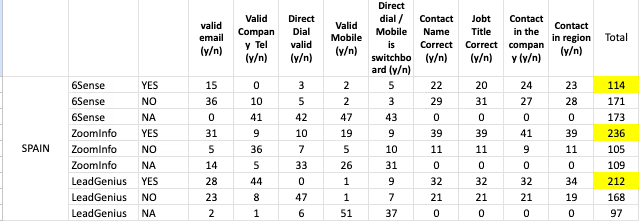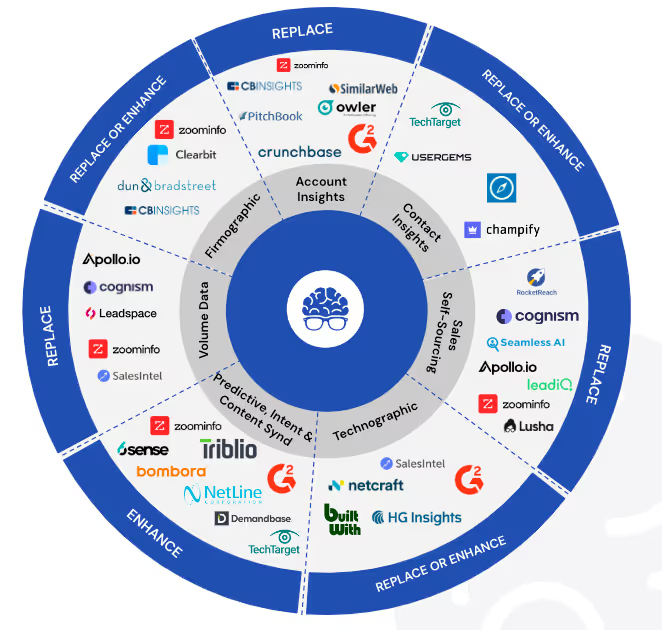If data is the new oil, then the data provider your GTM (Go-to-Market) team selects is equivalent to the drilling and refining company you trust to unearth the most valuable and rarest treasures. Just as a drilling company uses precision, expertise, and advanced technology to extract and refine oil, a top-tier data provider employs sophisticated methodologies, real-time analysis, and bespoke insights to deliver high-quality, actionable data. This data isn't just raw material; it's the refined, pure liquid gold that fuels strategic decisions, drives revenue growth, and creates competitive advantages in the marketplace.
For sales and marketing operations, choosing a data provider is akin to selecting a partner in growth. However, with a plethora of options, how do you ensure that your chosen provider meets your bespoke needs? Here are seven critical factors to consider:

1. Accuracy and Quality of Data
The bedrock of any successful data-driven decision-making strategy hinges on the integrity and caliber of the underlying data. High-quality data distinguishes itself through several critical characteristics: accuracy, timeliness, relevance, precision, refresh rates, last validated timestamps, and completeness. Each of these dimensions plays a pivotal role in ensuring that the insights derived are not only reliable but also actionable and aligned with your specific business objectives.
Accuracy is fundamental; data must correctly reflect the real-world entities or events it represents. Errors or inaccuracies can derail decision-making processes, leading to strategies that miss the mark, potentially causing significant financial losses or missed opportunities. Furthermore, the quality of data is paramount. It encompasses not just accuracy but also the richness and depth of the data, ensuring a comprehensive understanding of each subject area.
Precision in data goes hand in hand with its quality, referring to the granularity and specificity with which data points are defined and collected. This precision enables businesses to drill down into specifics, crafting strategies that target very narrow segments or operational nuances, thus enhancing the effectiveness of their actions.
Timeliness and refresh rates are about the currency of data. In a rapidly changing business environment, information can become obsolete quickly. Regular updates and a clear understanding of when the data was last refreshed or validated are essential to maintaining its relevance. Data providers must offer transparency about these refresh rates and last validated timestamps, enabling businesses to make informed decisions based on the latest available information.
Completeness is another critical aspect, ensuring that the data covers all necessary dimensions and variables relevant to your business needs. Gaps in data can lead to incomplete analyses and potentially overlook key insights that could inform strategic decisions.
The consequences of relying on subpar data are far-reaching. Beyond the immediate pitfalls of misinformed strategies and missed opportunities, there's a subtler yet profound impact on team dynamics. Trust in data-driven methodologies wanes when outcomes repeatedly fall short of expectations due to data inaccuracies. This erosion of confidence can lead to skepticism towards future initiatives, undermining the organization's ability to leverage data for competitive advantage.

2. Integration and Compatibility
The unobstructed integration of external data into your pre-existing Customer Relationship Management (CRM) and marketing automation platforms stands as a fundamental requirement for maintaining and improving operational efficiency within your organization. A data provider that excels in this area must deliver solutions that not only seamlessly blend with your existing technological infrastructure but also enhance its capabilities, facilitating an effortless exchange of data across systems. This level of compatibility is crucial as it guarantees that your teams can adopt and apply new insights without the need for extensive modifications to their current procedures, thereby preserving the rhythm of their daily activities while introducing the potential for significant enhancements.
Integration that is thoughtfully executed eliminates the common hurdles associated with adopting external data sources, such as the need for manual data manipulation or the potential for data silos that can fragment information and hinder its effective use. It ensures that data from the provider flows directly into your systems, ready for immediate use, thus accelerating the pace at which insights can be derived and applied.
Additionally, the ease of integration concerns how "out-of-the-box" data from the provider aligns with the fields and formats already established in your systems of record and action. A mismatch here can lead to inefficiencies and inaccuracies as data must be transformed or interpreted before it can be utilized, delaying insights and potentially compromising their accuracy. Your data provider should offer flexible data structures that can be easily mapped to your existing fields, respecting your internal taxonomy and data dictionary. This congruence is vital for ensuring that the data not only integrates technically but also makes sense within the context of your business operations, enabling your teams to make the most of the information without unnecessary translation or adjustment.
Moreover, considering your organization's unique internal taxonomy and data dictionary is critical when integrating external data. These elements represent the specific language and classifications your business uses to organize, interpret, and act on data. A data provider that allows for customization in this area, ensuring that incoming data respects and adheres to your internal classifications, significantly enhances the utility and applicability of the data. This alignment facilitates clearer, more straightforward analysis and decision-making, as the data reflects the nuances of your business's operational language and conceptual framework.
In sum, the seamless integration of external data with your CRM and marketing automation platforms is not just a matter of technical compatibility; it's about ensuring a synergistic relationship between new insights and existing workflows. By prioritizing solutions that offer ease of integration, respect for your internal data taxonomy, and the ability to directly map to your systems of record, you create an environment where data acts as a catalyst for efficiency and innovation, rather than an obstacle to be overcome.

3. Compliance and Privacy
In the modern landscape of data-driven business operations, the adherence to data privacy regulations such as the General Data Protection Regulation (GDPR) in the European Union and the California Consumer Privacy Act (CCPA) in the United States has become a cornerstone of ethical and sustainable practices. These regulations set forth stringent guidelines for the handling, storage, and use of personal data, aiming to protect individuals' privacy rights. For businesses, choosing a data provider that not only complies with these legal frameworks but also embodies the principles of privacy and data protection in their operations is crucial. Compliance is far more than a mere legal obligation to avoid penalties; it signifies a commitment to valuing and safeguarding customer privacy, which in turn fosters trust and loyalty among your customer base.
Data providers that prioritize compliance go to great lengths to ensure that their data collection, processing, and storage methodologies meet or exceed regulatory requirements. This commitment to compliance helps shield your business from the legal and financial repercussions associated with data breaches and non-compliance, which can include substantial fines and reputational damage. Furthermore, by partnering with a provider that respects privacy laws, you demonstrate to your customers that you are trustworthy stewards of their personal information, which is increasingly becoming a deciding factor for consumers and businesses alike in choosing whom to do business with.
Some data providers go above and beyond basic compliance by offering features like audit trails for their data sourcing behaviors. These audit trails provide transparent insight into the origins of the data, the methods used for its collection, and the steps taken to ensure its accuracy and legality. This level of transparency is invaluable for businesses seeking to maintain rigorous data governance standards and for meeting the scrutiny of regulatory audits.
Additionally, the most forward-thinking data providers can tailor their workflows and data handling practices to align with the specific requirements of your legal and compliance teams. This customization may include the development of specialized data acquisition methods, rigorous vetting processes for sources of truth, and adherence to bespoke data management protocols that meet or exceed industry standards.
When evaluating data providers, it's also wise to consider the terms of indemnification and the degree of control or input you have over the sources and collection methods. Indemnification clauses in agreements with data providers can protect your business from liabilities arising from potential data inaccuracies or legal infractions related to the data provided. Having a say in the selection of data sources and collection methodologies ensures that the data aligns with your ethical standards and compliance requirements, further minimizing risk.
In essence, the choice of a data provider in today's regulatory environment should be guided by a comprehensive evaluation of their commitment to data privacy and compliance. By doing so, you ensure that your operations are not only legally compliant but also aligned with the broader values of respect for individual privacy and the cultivation of consumer trust. This approach not only safeguards your business against the immediate risks of non-compliance but also positions it as a leader in ethical data practices, enhancing your reputation and competitive advantage in the long term.

4. Coverage and Completeness
The extent and depth of your data provider's coverage play a pivotal role in the scalability and reach of your business strategies, particularly for enterprises with aspirations to dominate on a global stage, akin to industry giants like SAP, Amazon, and Microsoft. A data provider's worth is measured not just by the breadth of geographic locations and industry sectors it encompasses but also by the granularity of its coverage within those domains. This comprehensive scope is crucial to ensure that your business doesn't miss out on untapped markets or potential audiences, thereby maximizing the opportunities for growth and expansion.
For businesses aiming to cast a wide net globally, the variation in coverage from state to state, country to country, and region to region can significantly impact the effectiveness of market penetration strategies. What works in one market might not translate directly to another due to cultural, economic, and regulatory differences. Thus, a data provider must be adept at offering nuanced, localized data that respects these variations, enabling businesses to adapt their approaches to each specific market effectively.
Furthermore, the disparity between upmarket (enterprise-level) and downmarket (SMBs) data capabilities highlights the need for a data provider to offer a range of insights that cater to different market segments. This adaptability ensures that whether your strategy targets large corporations or small businesses, the data at your disposal is equally insightful and actionable.
The concentration of data related to specific job titles and departments within organizations is another consideration that can significantly affect the relevance and utility of the information provided. Certain tools and data providers may offer extensive details on specific roles within organizations, such as IT or HR departments, but lack depth in others. For a business targeting a diverse set of personas—such as Marketing, Sales, and Revenue Operations leaders—it's imperative that the data provider can deliver meaningful insights across these varied groups. This level of detail ensures that your engagement strategies are informed and nuanced, directly addressing the needs and challenges of your key personas.
Before finalizing your choice of a data vendor, it's crucial to verify that your top personas are comprehensively covered in a meaningful manner. This involves not only assessing the quantity of data available for these personas but also evaluating the quality of insights, such as account signals and growth indicators, that can inform targeted, effective strategies. By ensuring your data provider offers this level of specificity and coverage, your business is better positioned to craft bespoke approaches for each market and persona, thereby enhancing the likelihood of successful global expansion and market penetration.

5. Support and Service
The caliber of support and service offered by your data provider extends far beyond the conventional customer service framework, acting as a pivotal factor that can either propel or hinder the efficacy of your data-driven strategies. In the realm of B2B operations, where data serves as the linchpin of decision-making, the distinction between a mere vendor and a strategic partner lies in the level of consultative services provided. Such services are not just add-ons but essential elements that enable your teams to decipher complex data landscapes, deriving actionable insights that fuel strategic initiatives.
This advanced layer of support is instrumental for teams dedicated to extracting the utmost value from their data investments. It involves a blend of education, guidance, and customized solutions that ensure data is not just accessible but also meaningful and aligned with specific business goals. The right provider offers more than just datasets; they offer a roadmap for transforming data into a strategic asset. This encompasses tailored advice on data integration, analytics best practices, and insight generation, ensuring that data is not only seamlessly incorporated into your operations but also serves as a catalyst for innovation and growth.
Moreover, in the dynamic sphere of sales and marketing, where the quest for a competitive edge is relentless, the depth of insights provided by your data can make a significant difference. Providers that excel in offering consultative services understand this nuance. They work closely with your teams to identify unique opportunities, optimize campaign strategies, and refine targeting approaches based on sophisticated data analyses. This level of engagement ensures that your sales and marketing efforts are not just data-informed but are driven by deep, nuanced understandings of market dynamics and customer behaviors.
Obtaining data is a nuanced process that transcends the mere acquisition of voluminous rows and columns. The true measure of value lies in how effectively this data is operationalized—to drive revenue, uncover insights, and inform strategic direction. A data provider that stands out in this capacity does more than answer queries; they engage proactively, helping to navigate complex business challenges and identify solutions that drive tangible ROI. Such a provider doesn't just deliver data; they deploy their expertise to ensure that the data you receive becomes a lever for strategic advantage.
In essence, a superior data provider acts as a collaborative partner, vested in your success and equipped to support your journey towards leveraging data for maximum impact. They understand that their role extends beyond the transactional, embracing a consultative approach that enriches your organization's data culture and capability. By prioritizing providers who offer this elevated level of support and service, you ensure that your data-driven initiatives are not only well-informed but also strategically aligned and primed for success. This partnership fosters an environment where data becomes the foundation of innovative strategies, driving forward your business objectives with precision and insight.

6. Transparency and Trust
Transparency and trust form the backbone of any fruitful relationship between a company and its data provider. In an era where data-driven decisions are not just strategic but essential, the clarity with which a data provider operates regarding its data sourcing, refreshing, and maintenance processes cannot be overstated. A provider committed to transparency will not shy away from divulging the specifics of their data collection methods, the algorithms or technologies used for data verification, and the frequency and criteria for data updates. This openness not only assures clients of the provider's commitment to quality and accuracy but also fosters a sense of reliability and integrity.
Moreover, trust in a data provider is solidified when their operations are transparent enough to allow clients to see the ethical considerations behind data sourcing. This includes adherence to privacy laws and regulations, respect for individuals' consent, and the avoidance of dubious data acquisition methods. Trust is further enhanced when a provider is forthcoming about their data's lineage—where it comes from, how it has been processed, and any transformations it has undergone. Such transparency ensures that clients are not just passively receiving data but are fully informed participants in the data ecosystem.
Top-tier solutions in the data space are distinguished by this level of trust. They understand that for marketing, sales, and revenue operations teams to fully leverage their insights, there must be unwavering confidence in the data's accuracy and ethical sourcing. This trust is not merely about believing in the data's current validity but also in the provider's ongoing commitment to maintaining these standards. When such trust exists, it elevates the data provider from a vendor to a vital extension of the revenue team—a partner whose contributions are integral to strategic planning, decision-making, and ultimately, the company's success in the market.
In essence, a worthy data provider understands that their role transcends the mere supply of data. They are custodians of trust, tasked with the critical responsibility of ensuring their data is not only accurate and up-to-date but also ethically sourced and transparently maintained. This commitment to transparency and trust is what differentiates the best in the business, making them indispensable allies in the quest for competitive advantage and operational excellence.

7. Cost-Effectiveness
In the evaluation of data vendors, the principle of value for money stands paramount. It's essential to conduct a thorough analysis of both the immediate and the extended return on investment (ROI) that their data integration brings to your operations. Providers like LeadGenius, which specialize in delivering customized insights and bespoke data, may initially seem like a costlier investment. However, the unique advantage they offer lies in the precision and relevance of their data, tailored specifically to your business's unique needs. This specificity can be a game-changer, enabling highly targeted strategies that resonate more effectively with your target audience, thereby enhancing campaign performances significantly. The result of such strategic alignment is often a notable increase in conversion rates and, subsequently, revenue growth—a clear indication of the value such an investment brings over time.
Conversely, platforms such as Zoominfo, while offering vast databases, tend to require a different approach to operationalize their data effectively. The necessity for sales representatives to engage deeply with the tool on a daily basis, manually building and refining lists, introduces a hidden cost—internal labor. This aspect of cost, frequently overlooked during the initial assessment, plays a crucial role in the overall value evaluation of a data provider. The time and resources spent by your team in maneuvering within these tools to extract value must be accounted for and factored into the total cost of ownership. As such, when the time comes for subscription renewal, a comprehensive reassessment of these labor costs, alongside the direct expenses and the tangible benefits derived from the tool, becomes critical.
Choosing the right data provider, therefore, transcends a mere transactional decision. It is, in fact, a strategic one that demands a holistic view of not just the financial outlay but also the operational implications and the broader impact on your go-to-market strategy. In today’s fast-evolving business landscape, where the demand for customized insights and bespoke data is ever-increasing, aligning with a data vendor that can truly meet these needs is imperative. Such a choice can greatly influence the effectiveness of your marketing and sales initiatives, thereby playing a pivotal role in the overarching success of your business.
To navigate this decision-making process effectively, weighing the seven critical factors outlined is essential. These include the quality and accuracy of data, integration capabilities, compliance adherence, coverage scope, level of support and service, and, crucially, cost-effectiveness in relation to the value delivered. In an era increasingly defined by the strategic use of data, selecting a data provider that meets these criteria is not just beneficial but necessary for ensuring that your business remains competitive and poised for growth in the dynamic marketplace.

Traps to Avoid
Evaluating B2B data vendors is a critical process for businesses aiming to enhance their sales, marketing, and operational strategies. However, in the pursuit of finding the right data partner, companies often encounter pitfalls that can significantly impact the effectiveness of their data-driven initiatives. Here are some common mistakes people make when evaluating different B2B data vendors:
Overlooking Data Quality for Quantity
A common mistake is prioritizing the volume of data over its quality. While having a vast amount of data sounds appealing, irrelevant or outdated data can clutter your systems and lead to misguided decisions. It's vital to focus on the accuracy, relevancy, and freshness of data rather than just the quantity. We call this the data.com fallacy.
Neglecting Integration Capabilities
Failing to consider how easily a vendor’s data can be integrated into existing systems is a significant oversight. Integration challenges can lead to increased costs and operational inefficiencies. It's essential to ensure the data can seamlessly flow into your CRM, marketing automation platforms, and other critical tools. Every good tool should cover your standard CRM/MAS platforms and have an Open API for more sophisticated data refreshes.
Underestimating the Importance of Compliance
With data privacy laws such as GDPR and CCPA becoming more stringent, neglecting to evaluate a vendor’s compliance can result in legal and reputational risks. Ensuring that a data provider adheres to all relevant regulations is crucial to protect your company and your customers. Outlining your company's organization data governance and playbook is key.
Ignoring Vendor’s Data Sources and Methodologies
Not all data is created equal, and the sources and methodologies used by vendors to collect, verify, and update their data can greatly influence its reliability. Failure to understand and scrutinize these aspects can lead to partnering with vendors whose data might not be trustworthy or robust.
Disregarding the Need for Scalable Solutions
As businesses grow, their data needs evolve. Choosing a data vendor without considering scalability can limit your growth and necessitate costly changes down the line. It’s important to select a vendor that can grow with your business, offering flexible and scalable data solutions. Many companies do not cover SMBs well in their coverage capabilities, something to keep in mind as your think about expanding down market.
Overlooking Customer Support and Service
The level of support and service offered by a data vendor is often underestimated. After the sale, you may need ongoing support for integration, troubleshooting, or deriving insights from the data. A vendor that offers excellent customer service and consultative support can enhance the value of the data provided.
Making Decisions Based Solely on Cost
While budget constraints are a reality, choosing a data vendor based solely on price can be shortsighted. The cheapest option might not offer the best value in terms of data quality, service, and support. Evaluating the ROI and considering the long-term benefits of high-quality data is essential.
Not Requesting Demos or Trials
Skipping the step of requesting a demo or a trial period with the data can lead to surprises after commitment. Demos and trials allow you to evaluate the data's quality, relevance, and integration capabilities firsthand, ensuring it meets your specific needs.
Avoiding these mistakes requires thorough research, clear understanding of your data needs, and careful consideration of how a data vendor's offerings align with your strategic goals. By addressing these aspects, businesses can select a data partner that not only meets their current requirements but also supports their growth and evolution over time.
Framework for Evaluation or Bakeoff
When evaluating data providers to ensure the best fit for a company's go-to-market strategy, it’s crucial to establish a comprehensive framework that encompasses key performance indicators and quality metrics. The goal of this framework is to identify providers that offer high-quality, accurate, and actionable data, which is vital for targeted marketing and sales outreach. Below is a short, effective framework to guide companies through this process, focusing on fill rates, match rates, accuracy rates, direct dial availability, correctness of data, and accuracy of email addresses.
1. Data Quality Assessment
- Accuracy Rates: Measure the percentage of records that are accurate and up-to-date across all data points provided. This should cover the correctness of contact names, job titles, company details, and geographical location.
- Valid Email Addresses (Y/N): Check the proportion of email addresses that are deliverable and free from bounces.
- Valid Company Telephone (Y/N): Evaluate the accuracy and currency of the main company telephone numbers provided.
- Direct Dial Validity (Y/N): Assess the percentage of direct dials that are accurate and lead directly to the intended contact, not a general switchboard.
- Valid Mobile Numbers (Y/N): Determine the validity and reachability of mobile phone numbers in the dataset.
- Direct Dial/Mobile is Switchboard (Y/N): Identify the rate of direct dials or mobile numbers that mistakenly lead to a switchboard or general company line.
2. Data Completeness Evaluation
- Fill Rates: Assess the completeness of data across all fields provided. High fill rates indicate more comprehensive data, which is crucial for detailed segmentation and targeting.
- Contact Name Correctness (Y/N): Verify the accuracy of contact names to ensure personalization in outreach efforts.
- Job Title Accuracy (Y/N): Confirm the correctness of job titles to guarantee that messaging resonates with the intended audience and their responsibilities.
- Contact Presence in Company (Y/N): Ensure that the contacts listed are current employees of the stated companies to improve outreach relevance.
- Contact Location Relevance (Y/N): Confirm that the contact's location matches your geographical targeting criteria, whether it’s regional, national, or global.
3. Match Rate Analysis
- Overall Match Rate: Calculate the percentage of records from your initial request or sample that the data provider can match and provide data for. High match rates indicate a provider's ability to meet your data needs.
- Segment-Specific Match Rates: For more nuanced analysis, evaluate match rates within specific segments of interest, such as industry verticals, job functions, or company sizes.
4. Integration and Usability Assessment
- Ease of Integration: Consider how easily the data can be integrated into your existing CRM and marketing automation systems without extensive manipulation or customization.
- Data Refresh Frequency: Evaluate how often the data provider updates their datasets. Frequent updates are essential to maintain the accuracy and relevance of the data.
5. Compliance and Privacy
- Adherence to Regulations: Ensure that the data provider complies with relevant data privacy laws (e.g., GDPR, CCPA) and has robust data handling and security practices in place. Can a company reveal their sources or are they a blackbox of information.
Example Metrics:
- Valid Email %
- Valid Company Telephone %
- Valid Direct Dial %
- Valid Mobile %
- Contact Name matches phone number %
- Contact within Region
- Contact within ICP
- Contact at Company

Final Thoughts
In the dynamic and evolving landscape of data-driven strategies, selecting the right data provider is tantamount to finding the most adept drilling company in the oil industry; one that not only uncovers but also refines the data-oil, transforming it into the actionable insights that power your GTM strategies. Just as the value of oil lies in its extraction, refinement, and application, the true worth of data is realized through precision, accuracy, and bespoke insights that drive strategic decisions, foster growth, and carve out competitive advantages. In navigating the complexities of the data marketplace, choosing a partner equipped with the sophistication to tailor insights to your unique needs is not just beneficial but essential. Such a partnership ensures that your GTM efforts are fueled by the most valuable resource in today's economy—custom, actionable data, refined from the vast digital expanse into the pure gold that propels your business forward.




